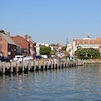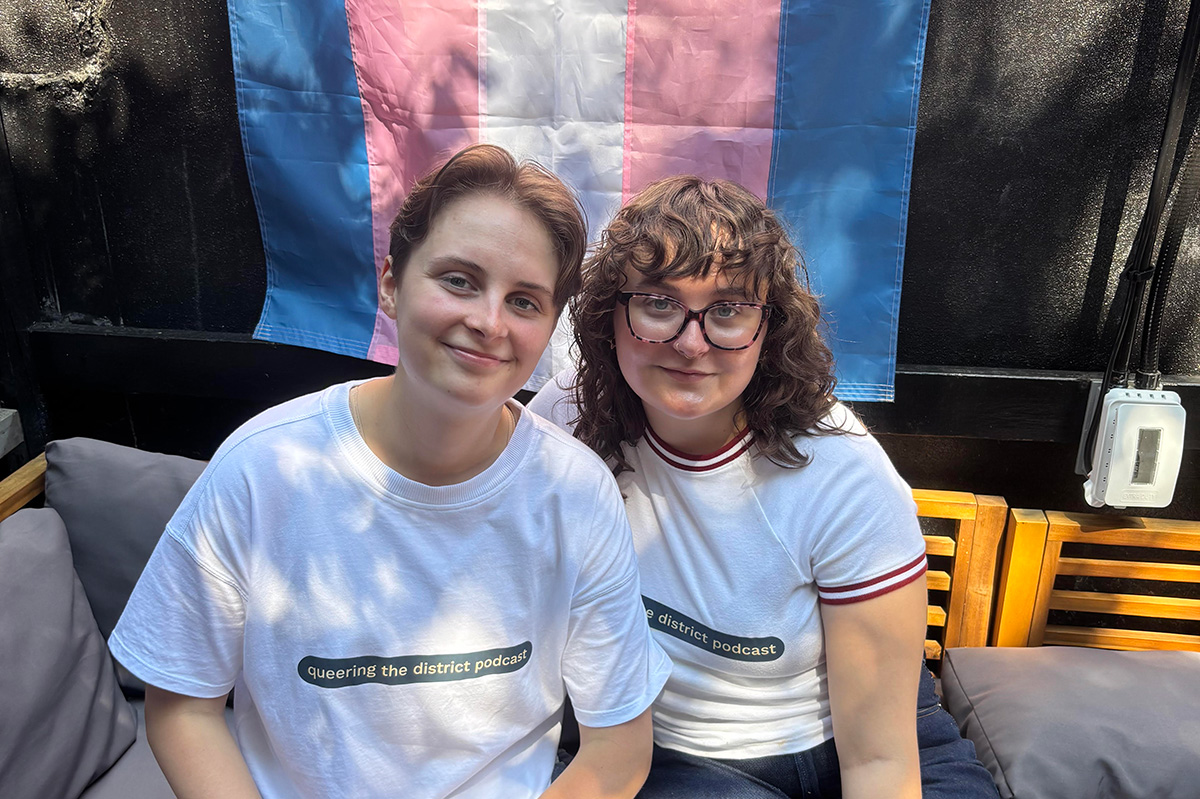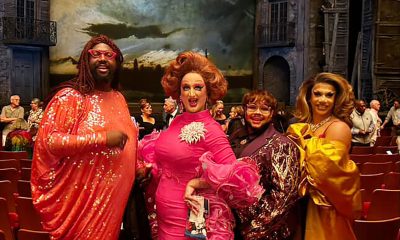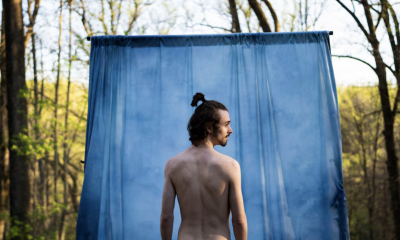Arts & Entertainment
Hot Hits & Hidden Jewels
Concerts, performances, exhibitions and more!

Wolf Trap Opera Company: Opera’s Greatest Hits from Wolf Trap Opera’s Alumni Stars Wed, Aug 24 Wolf Trap. 1-877-WOLFTRAP. For one night only, singers representing all four decades of WTOC’s history gather on the Filene Center stage to perform arias and ensembles from their signature roles by Verdi, Wagner, Puccini, Mozart and more.
Featuring sopranos Tracy Dahl, Mary Dunleavy, and Emily Pulley, mezzo-sopranos Stephanie Blythe and Denyce Graves, tenors Lawrence Brownlee, Nicholas Phan, Carl Tanner, and James Valenti, baritones Richard Paul Fink and Robert Orth, bass-baritone Alan Held, and bass Matt Boehler.
ArtJamz at the Corcoran: Painting Big Sessions Wed, Aug 24 thru Fri, Aug 26 Corcoran Gallery of Art. 202-393-3939. Experience the art party that is taking D.C. by storm! Enjoy wine and soft drinks, hors d’oeuvres, and great music in Gallery 31 as you create a wonderful work of art–which is yours to take home. Paints and canvases provided.
Reggie Watts Live in Concert Tue, Aug 23 thru Fri, Aug 26 Woolly Mammoth. 202-393-3939. Reggie Watts–hailed by GQ magazine as “the coolest comedian on the planet” Is a comedian and musician of New York’s alternative-comedy scene. His performances are all created on-the-spot so no two performances are ever the same.
The Guide to Arts & Culture is provided by CultureCapital, a program of the Cultural Alliance of Greater Washington.
LAST CHANCE
Sun, Aug 21 Race to the End of the Earth Exhibition, National Geographic. 202-857-7700.
Steel Magnolias, Keegan Theatre, Church Street Theater. 703-892-0202.
The Importance of Being Earnest, SCENA Theatre at H Street Playhouse, H Street Playhouse. 703-683-2824.
LIMITED ENGAGEMENT
Aug 19 – Aug 20 Gipsy Kings, Wolf Trap.
ONE NIGHT ONLY
Fri, Aug 19 Jazz in the Garden: Alex Brown, National Gallery of Art. 202-737-4215.
Sat, Aug 20 Film Series: UCLAís Annual Festival of Preservation: On the Vitaphone, 1928ñ1930; Rendezvous with Annie preceded by A Selection of ‘Soundies’, National Gallery of Art. 202-737-4215.
George’s Intervention/Morgue Story Double Feature, Artisphere. 703-875-1100.
Hollywood and the Civil War, Surratt House Museum. 301-868-1121.
Sun, Aug 21 Film Series: UCLAís Annual Festival of Preservation: Strangers in the Night followed by The Big Shakedown, National Gallery of Art. 202-737-4215.
The Beach Boys, Wolf Trap. 1-877-WOLFTRAP.
Mon, Aug 22 5th Annual Charles Guggenheim Tribute Program: A Time for Justice, National Archives. 202-357-5000.
Tue, Aug 23 Ballet West, Wolf Trap. 1-877-WOLFTRAP.
Wed, Aug 24 The Rich Have Their Own Photographers, Artisphere. 703-875-1100.
Thu, Aug 25 Environmental Film Festival Screening: The City Dark, E Street Cinema. 202-342-2564.
HILTON ‘TRE’ FELTON TRIO: Live Jazz Happy Hour Thursdays, Artisphere. 703-875-1100.
The National Womanís Party and Political Rhetoric: Visual Propaganda in the Battle for the Vote, National Archives. 202-357-5000.
The Temptations & The Four Tops, Wolf Trap. 1-877-WOLFTRAP.
Tribute To Simon & Garfunkel and Paul Simon, Strathmore. 301-581-5100.
ONGOING-STAGE
‘Pop!,’ The Studio Theatre. 202-332-3300.
Sydney Theatre Company’s ‘Uncle Vanya,’ Kennedy Center. 202-467-4600.
‘Grease,’ Olney Theatre Center. 301-924-3400.
‘A Child Shall Lead Them,’ Clarice Smith. 301-405-7794.
‘The Capital City Showcase,’ DCAC. 202-462-7833.
ONGOING-MUSEUM EXHIBITONS
Corcoran Gallery of Art. Recent Photography Acquisitions, Free Summer Saturdays at the Corcoran, Chris Martin: Painting Big. 202-639-1700.
National Gallery of Art. A Masterpiece from the Capitoline Museum, Rome: The ‘Capitoline Venus’, In the Tower: Nam June Paik, Italian Master Drawings from the Wolfgang Rajten Collection, The Gothic Spirit of John Taylor Arms, From Impressionism to Modernism: The Chester Dale Collection, A New Look: Samuel F.B. Morse’s ‘Gallery of the Louvre’. 202-737-4215.
National Geographic. Machu Picchu: A Lost City Uncovered, Photographs from the Hiram Bingham Expeditions 1911-1915, The Etruscans: An Ancient Italian Civilization. 202-857-7700.
Museum of Women in the Arts. Pressing Ideas: Fifty Years of Women’s Lithographs from Tamarind, The Guerrilla Girls Talk Back. 202-783-5000.
ONGOING-ART GALLERIES
‘Local Color,’ Gallery plan b. 202-234-2711.
Janis Goodman | Paintings, Reyes + Davis Independent Exhibitions, Stage Premier Realtor.
‘Scapes,’ The Art League. 703-683-1780.
14th Annual National Small Works, Washington Printmakers Gallery. 301-273-3660.
Barcode Orchestra, ‘Repetition is a Form of Change: The Process and Practice of GIF Art Online,’ Mantra Samplers: Maribeth Egan, Artisphere. 703-875-1100.
‘PHOTO 2011: Annual Juried Mid-Atlantic Photo Exhibition,’ Artisphere. 703-875-1100.
‘1460 Wall Mountables!,’ DCAC. 202-462-7833.
‘The Spirit of Wood: Sculpture by Katie Dell Kaufman and Lynda Smith-Bugge,’ Zenith The Gallery, Eleven Eleven Sculpture Space.
‘1st Annual Workhouse National Ceramics Exhibition,’ Workhouse Arts Center. 703-584-2900.
2nd Saturday Art Walk, Workhouse Arts Center. 703-584-2900.
Photos
PHOTOS: Independence Day Weekend in Rehoboth
Wicked Green Pool Party, fireworks among festivities

Vacationers and residents alike enjoyed Independence Day Weekend activities in Rehoboth Beach, Del. The Wicked Green Pool Party drew hundreds to the CAMP Rehoboth fundraiser on Saturday. That evening, revelers went to the rooftops to watch the fireworks display.
(Washington Blade photos by Daniel Truitt)













Music & Concerts
Red, White, and Beyoncé: Queen Bey takes Cowboy Carter to D.C. for the Fourth of July
The legendary music icon performed on July 4 and 7 to a nearly sold-out Northwest Stadium.

Just in time for Independence Day, Beyoncé lit up Landover’s Commanders Field (formerly FedEx Field) with fireworks and fiery patriotism, bringing her deeply moving and genre-defying “Cowboy Carter” tour to the Washington, D.C. area.
The tour, which takes the global icon across nine cities in support of her chart-topping and Grammy-winning country album “Cowboy Carter,” landed in Prince George’s County, Maryland, over the Fourth of July weekend. From the moment Beyoncé stepped on stage, it was clear this was more than just a concert — it was a reclamation.
Drawing from classic Americana, sharp political commentary, and a reimagined vision of country music, the show served as a powerful reminder of how Black Americans — especially Black women — have long been overlooked in spaces they helped create. “Cowboy Carter” released in March 2024, is the second act in Beyoncé’s genre-traversing trilogy. With it, she became the first Black woman to win a Grammy for Best Country Album and also took home the coveted Album of the Year.
The record examines the Black American experience through the lens of country music, grappling with the tension between the mythology of the American Dream and the lived realities of those historically excluded from it. That theme comes alive in the show’s opening number, “American Requiem,” where Beyoncé sings:
“Said I wouldn’t saddle up, but
If that ain’t country, tell me, what is?
Plant my bare feet on solid ground for years
They don’t, don’t know how hard I had to fight for this
When I sing my song…”
Throughout the performance, Beyoncé incorporated arresting visuals: Black cowboys on horseback, vintage American iconography, and Fox News clips criticizing her genre shift — all woven together with voiceovers from country legends like Dolly Parton and Willie Nelson. The result was a multimedia masterclass in storytelling and subversion.
The “Cowboy Carter” tour has been a social media sensation for weeks, with fans scrambling for tickets, curating elaborate “cowboy couture” outfits, and tailgating under the summer sun. At Commanders Field, thousands waited in long lines for exclusive merch and even longer ones to enter the stadium — a pilgrimage that, for many, felt more like attending church than a concert.
One group out in full force for the concert was Black queer men — some rocking “denim on denim on denim on denim,” while others opted for more polished Cowboy Couture looks. The celebration of Black identity within Americana was ever-present, making the concert feel like the world’s biggest gay country-western club.
A standout moment of the night was the appearance of Beyoncé’s 13-year-old daughter, Blue Ivy Carter. Commanding the stage with poise and power, she matched the intensity and choreography of her mother and the professional dancers — a remarkable feat for someone her age and a clear sign that the Carter legacy continues to shine.
It’s been nearly two decades since Beyoncé and Destiny’s Child parted ways, and since then, she’s more than lived up to her title as the voice of a generation. With “Cowboy Carter,” she’s not just making music — she’s rewriting history and reclaiming the space Black artists have always deserved in the country canon.
a&e features
From Prohibition to Pride: Queering the District podcast reveals local LGBTQ history
The new podcast explores the hidden history and enduring impact of queer spaces in Washington, D.C.

On June 25, as Pride month inched toward its end, three queer creators launched an ambitious project to honor the spaces that built D.C.’s LGBTQ community—and connect them to today’s queer life. The first episode of their podcast, Queering the District, hit streaming platforms that day, aiming to spotlight what host and co-creator Abby Stuckrath calls “third places”: bars, clubs, and gathering spots that have served as hubs for queer life across the city.
Each episode of the 10-part series delves into a different piece of D.C.’s queer past—from landmark clubs to untold personal stories—told through the voices of drag legends, activists, DJs, historians, and patrons who lived it. The show also threads together personal experiences from today’s community, bringing the listener on an auditory journey from Prohibition-era speakeasies to contemporary nights out at places like As You Are or Saints & Sinners.
Abby Stuckrath, alongside her sibling Ellie Stuckrath, and producer Mads Reagan, make up the podcast’s creative team. A recent journalism graduate of American University, Abby told the Blade that her passion for queer storytelling began during college—and that D.C. itself played a defining role in shaping her queer identity.
“I went to American University. I graduated last year and studied journalism. When I was in school, I always wanted to focus on queer stories – especially in D.C., because I’m from Denver, Colorado, I’ve never lived in a place like this before. D.C. has always just kind of been a place I call home when it comes to my queer identity.”
But breaking into the media to tell those stories wasn’t easy. Stuckrath quickly learned that editorial support—and funding—for queer-focused projects is limited. So she decided to do it her own way.
“I kind of found out that if you want to tell stories, you kind of have to do it on your own– especially when it comes to queer stories. There’s not a lot of people begging for us to talk about queer people and to pay you for it. So I was like, ‘Okay, let’s just do it on my own.’”
The idea for the podcast first took root in conversations with Ellie, Abby’s sibling and biggest supporter. Ellie had also moved to D.C. to find more space to explore and express their queer and gender identities. Together, the two began shaping a vision that would combine storytelling, sound design, and grassroots community input.
“I was like, ‘I don’t know what exactly I want to do yet, but I want it to be queer, and I want it to be about D.C., and it’s going to be called Queering the District, and we’re going to find out what that means.’ And Ellie is my biggest supporter, and my best friend. And they were like, ‘Hell yeah. Like, let’s do this.’ And so we decided to just do it together.”
The name stuck—and so did the mission. The team began researching queer D.C. history and found a city overflowing with stories that had rarely been documented, especially in mainstream archives.
“We started looking up the history of queer culture in D.C., and it kind of just clicked from there,” Stuckrath said. “I did not know anything about how rich our history is in the city until one Google search, and then I just kept learning more and more. I was kind of pissed because I studied gender studies in school in D.C. and didn’t learn shit about this.”
Season one focuses on the role of third places—non-work, non-home spaces where queer people could gather, exist fully, and build community.
“Third places have always been the epicenter of queer life… places outside of just your own personal home, because sometimes that isn’t a safe place. And of course, the work most commonly in the past and still today, isn’t a safe place for queer people to be full of themselves. So like, bars were the first place for queer people to really thrive and meet each other.”
To make the show participatory, Queering the District includes a twist: a voicemail line where anyone can call in and share a memory or question. The team calls the phone “Fifi”—a nod to the kind of retro guestbooks often used at weddings, but reimagined for queer nightlife and history.
“We wanted to find a way for people to share their stories with us anonymously… so even though we start in Prohibition, we wanted to connect it to now—like, those people who were singing jazz to each other in a white queer bar are connected to you singing karaoke on a Sunday night at your favorite gay bar. We’re all interconnected by this third place of queer bars in D.C.”
Those connections are emotional as well as historical. While building the series, one realization hit Stuckrath particularly hard: the immense loss of queer spaces in D.C., especially in neighborhoods that have since been heavily redeveloped.
“Every time I go to a Nats game, I think about, well, this just replaced five gay bars that used to be here. It used to be the home of Ziegfeld’s… Tracks, which was almost 2,000 square feet, with a volleyball court in the back, a fire pit, and iconic light show. I just didn’t know that we had that, and it made me sad for the queer elders that are in our city now who walk the streets and don’t see all those places they used to call home.”
That sense of loss—alongside the joy and resilience of queer community—is what the show aims to capture. As the podcast continues, Abby hopes it serves as both a celebration and an educational tool, especially for young LGBTQ people arriving in D.C. without realizing the queer foundations they’re walking on.
“D.C. is a unique city, and specifically young queer people who are hoping to move to the city—to know that you’ve got to know your history to be here. I hope this serves as an easier way for you to consume and learn about queer history, because queer history defines how we move in life.”
And for all the voices still left out, Abby is clear: this podcast is an open door, not a final word.
“This is a perfectly imperfect podcast. We should just be a starting point. We shouldn’t be the ending point.”
New episodes of Queering the District drop every Wednesday on all major platforms.
-

 Virginia1 day ago
Virginia1 day agoDefying trends, new LGBTQ center opens in rural Winchester, Va.
-

 South Africa4 days ago
South Africa4 days agoLesbian feminist becomes South African MP
-

 Travel3 days ago
Travel3 days agoManchester is vibrant tapestry of culture, history, and Pride
-

 Opinions2 days ago
Opinions2 days agoUSAID’s demise: America’s global betrayal of trust with LGBTQ people












